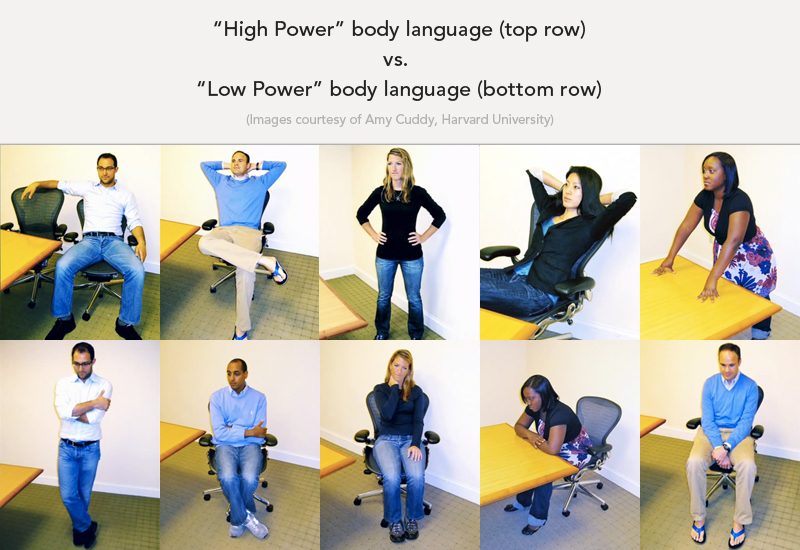Yesterday, a presentation by a colleague about body movement and its effects on physiology drew my attention to this TED Talk by Amy Cuddy:
The point of her talk is that standing or sitting in "power stances" can not just change how people see you, they can change yourself. Just two minutes of standing like a superhero can increase your testosterone and decrease your cortisol -- in other words, your stress goes down and your confidence goes up. People who did two minutes of power poses before interviews were more likely to get the job.
Cuddy doesn't belabor the point, but she starts off interested in this question because of a gendered effect she was seeing of women in business school not participating as much, and therefore not succeeding as much.
I remember in seminary noticing this effect, although I didn't notice the science behind it. I remember sitting on the sofa in the Curtis Room at Meadville Lombard, and a male student came and sat next to me. He sat down immediately into one of Cuddy's power poses -- arms stretched out along the back of the sofa, legs open. (Almost exactly the pose that's in the upper left of the image above.) He seemed to own the space that he occupied, and the space that I occupied as well. Now there's nothing wrong with that, but I remember thinking, "Wow. You never see a woman spread herself over a space like that." And, generally, that's pretty true. My male colleague felt comfortable in a power pose in a public setting, and I did not. The problem isn't that he did. Rather, the problem is that women often don't own their space the same way. And the result is both chicken and egg -- we don't have the increased confidence that would have us taking such stances, but the lack of taking such stances also diminishes confidence. Putting yourself in a "closed" position decreases your testosterone and increases your cortisol.
Regarding the "superhero" pose, I remember vividly a time when I struck that pose. I was auditioning for a play, Captain Fantastic, my junior year in high school. As part of the audition, we were asked to strike the superhero pose, and I did so. And the room broke up in laughter. I attributed it to a size issue. I wasn't obese, but I was buxom, and that apparently made the superhero stance humorous. But my learning that day was that I wasn't a superhero, by body type. I was cast as the school principle instead. (This is not all bad. Despite not being a superhero, the principle was in every single scene and had more lines than anyone other than the two leads. So it was a better part. And it remains my largest theatrical role to date.)
I've thought a lot over the years as I've become a fat person about the way that fat people are shamed by society, and how that makes us alter our stance. If it's rare to see a woman in a power pose, it's even more rare to see a fat person in one. We're taught, I think, that we take up so much space already that we must put our body into "closed" positions to minimize the effect, rather than taking up even more space in an "open" position. What I hadn't realized was that the way we alter our stance not only changes how people see us, it alters ourselves, as well.
I thought about this as I heard a report on NPR on the way home from that same collegial meeting yesterday that said fat people don't run as much for public office, and when they do they lose at a high rate -- and for women it's worse than men. (Couldn't find the NPR link, but here's the same study reported on CBS.) It wouldn't be surprising if this prejudice also affected other highly public image-conscience jobs, like ministry. In fields that's are much about authority and power, I wondered what the power stance effect might be, and how that might be relating to weight. Part of the problem with the politicians not getting elected -- or ministers not getting called -- is probably the public's perception and negative image of fat people. But we also know that the power stance thing can influence people's performance. Negative self-image and negative perception by others form a loop where each influences the other, and it can be a downward spiral or an upward spiral.
There are things other people can do to break the spiral. After posting about fat shaming last year, I got some push-back. The fat-shamers believe this: "Fat is bad for you. If I shame you about your fat, you might lose it. That would be good for you. If I accept your fat, you won't lose it. That's bad for you." The truth is this: Increase fat acceptance leads to more confident fat people. Fat people who are more confident will more often take stances that decrease their cortisol. This, in turn, will decrease their appetite and cravings. A person who truly cares about the health and well-being of someone will praise, not shame, that person. And I don't mean just praising weight-loss efforts -- we understand those for the back-handed compliments they are. I mean praising a person's awesomeness just the way they are. That's what other people can do.
And for fat people, this is the little thing we can do to break that spiral, as well. I believe fat people are often putting themselves into a "closed" position that increases their stress levels and decreases their confidence. And, not surprisingly, increased cortisol also increases appetite and cravings, and decreases muscle mass. And it increases depression. Doing the opposite -- adopting the open power stances can reverse the cycle.
So today, I'm telling myself and fat people everywhere: you are a superhero. Stand like one. For at least two minutes.

